Plato and Descartes on Self Analysis: Philosophical Positions
VerifiedAdded on 2022/08/11
|6
|1467
|60
Essay
AI Summary
This essay provides a comparative analysis of Plato and Descartes' philosophical positions on self-analysis, focusing on their contrasting views on the mind-body relationship and the nature of the soul. The essay examines Plato's emphasis on the soul's immortality and its separation from the body, as presented in his work Phaedo, contrasting it with Descartes' concept of mind-body dualism as articulated in his Meditations. The essay highlights points of agreement and disagreement between the two philosophers, particularly regarding the role of the mind and the soul in understanding the self. Furthermore, the essay explores which position the author agrees with more, providing reasons for their opinion, referencing the philosophical arguments each thinker used to support their claims. The author agrees with Descartes' view, emphasizing his distinction between the mind and soul and his assertion that the soul can exist separately from the body, aligning with Descartes' perspective on the individual's connection to the soul and the importance of faith in his philosophical framework.
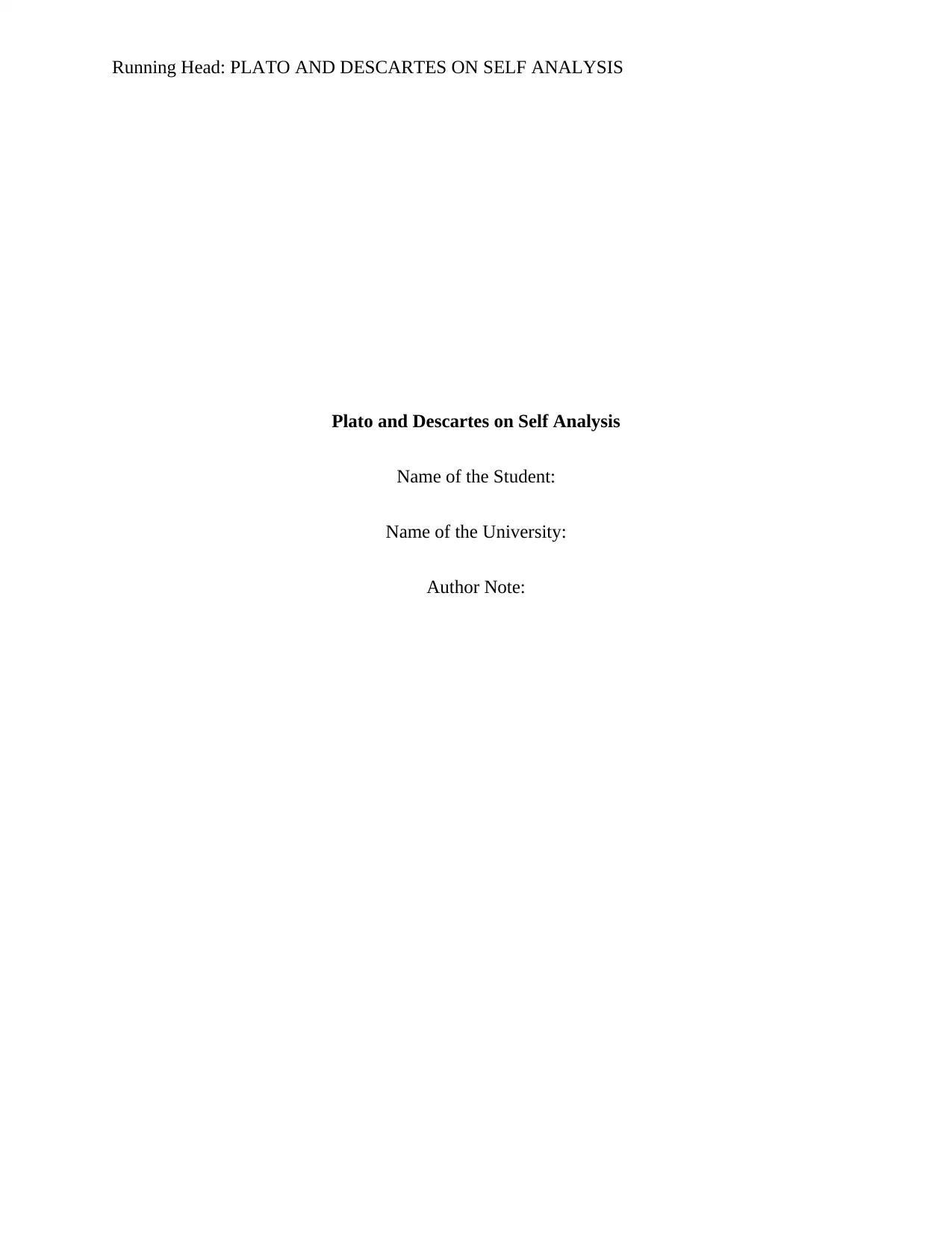
Running Head: PLATO AND DESCARTES ON SELF ANALYSIS
Plato and Descartes on Self Analysis
Name of the Student:
Name of the University:
Author Note:
Plato and Descartes on Self Analysis
Name of the Student:
Name of the University:
Author Note:
Paraphrase This Document
Need a fresh take? Get an instant paraphrase of this document with our AI Paraphraser
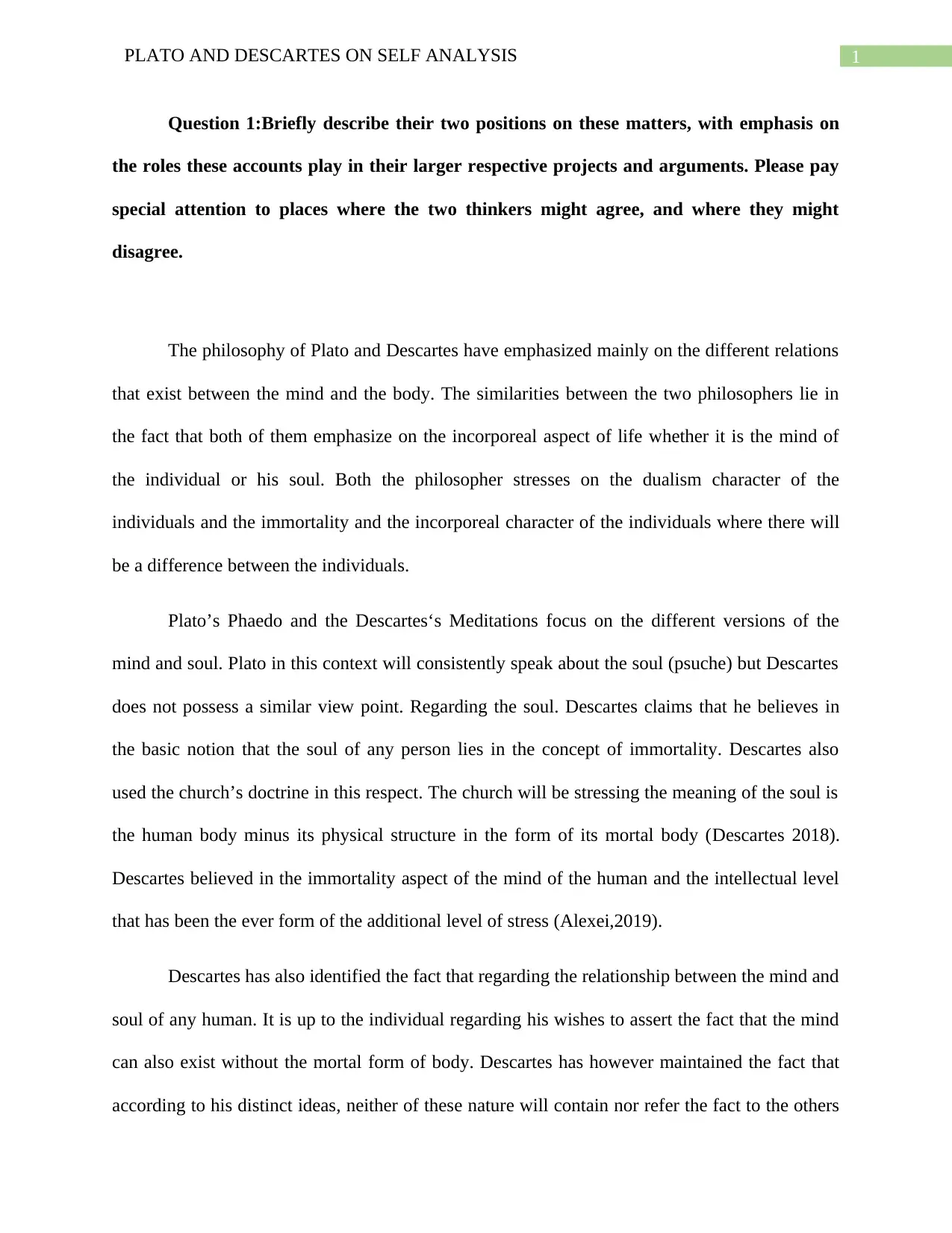
1PLATO AND DESCARTES ON SELF ANALYSIS
Question 1:Briefly describe their two positions on these matters, with emphasis on
the roles these accounts play in their larger respective projects and arguments. Please pay
special attention to places where the two thinkers might agree, and where they might
disagree.
The philosophy of Plato and Descartes have emphasized mainly on the different relations
that exist between the mind and the body. The similarities between the two philosophers lie in
the fact that both of them emphasize on the incorporeal aspect of life whether it is the mind of
the individual or his soul. Both the philosopher stresses on the dualism character of the
individuals and the immortality and the incorporeal character of the individuals where there will
be a difference between the individuals.
Plato’s Phaedo and the Descartes‘s Meditations focus on the different versions of the
mind and soul. Plato in this context will consistently speak about the soul (psuche) but Descartes
does not possess a similar view point. Regarding the soul. Descartes claims that he believes in
the basic notion that the soul of any person lies in the concept of immortality. Descartes also
used the church’s doctrine in this respect. The church will be stressing the meaning of the soul is
the human body minus its physical structure in the form of its mortal body (Descartes 2018).
Descartes believed in the immortality aspect of the mind of the human and the intellectual level
that has been the ever form of the additional level of stress (Alexei,2019).
Descartes has also identified the fact that regarding the relationship between the mind and
soul of any human. It is up to the individual regarding his wishes to assert the fact that the mind
can also exist without the mortal form of body. Descartes has however maintained the fact that
according to his distinct ideas, neither of these nature will contain nor refer the fact to the others
Question 1:Briefly describe their two positions on these matters, with emphasis on
the roles these accounts play in their larger respective projects and arguments. Please pay
special attention to places where the two thinkers might agree, and where they might
disagree.
The philosophy of Plato and Descartes have emphasized mainly on the different relations
that exist between the mind and the body. The similarities between the two philosophers lie in
the fact that both of them emphasize on the incorporeal aspect of life whether it is the mind of
the individual or his soul. Both the philosopher stresses on the dualism character of the
individuals and the immortality and the incorporeal character of the individuals where there will
be a difference between the individuals.
Plato’s Phaedo and the Descartes‘s Meditations focus on the different versions of the
mind and soul. Plato in this context will consistently speak about the soul (psuche) but Descartes
does not possess a similar view point. Regarding the soul. Descartes claims that he believes in
the basic notion that the soul of any person lies in the concept of immortality. Descartes also
used the church’s doctrine in this respect. The church will be stressing the meaning of the soul is
the human body minus its physical structure in the form of its mortal body (Descartes 2018).
Descartes believed in the immortality aspect of the mind of the human and the intellectual level
that has been the ever form of the additional level of stress (Alexei,2019).
Descartes has also identified the fact that regarding the relationship between the mind and
soul of any human. It is up to the individual regarding his wishes to assert the fact that the mind
can also exist without the mortal form of body. Descartes has however maintained the fact that
according to his distinct ideas, neither of these nature will contain nor refer the fact to the others
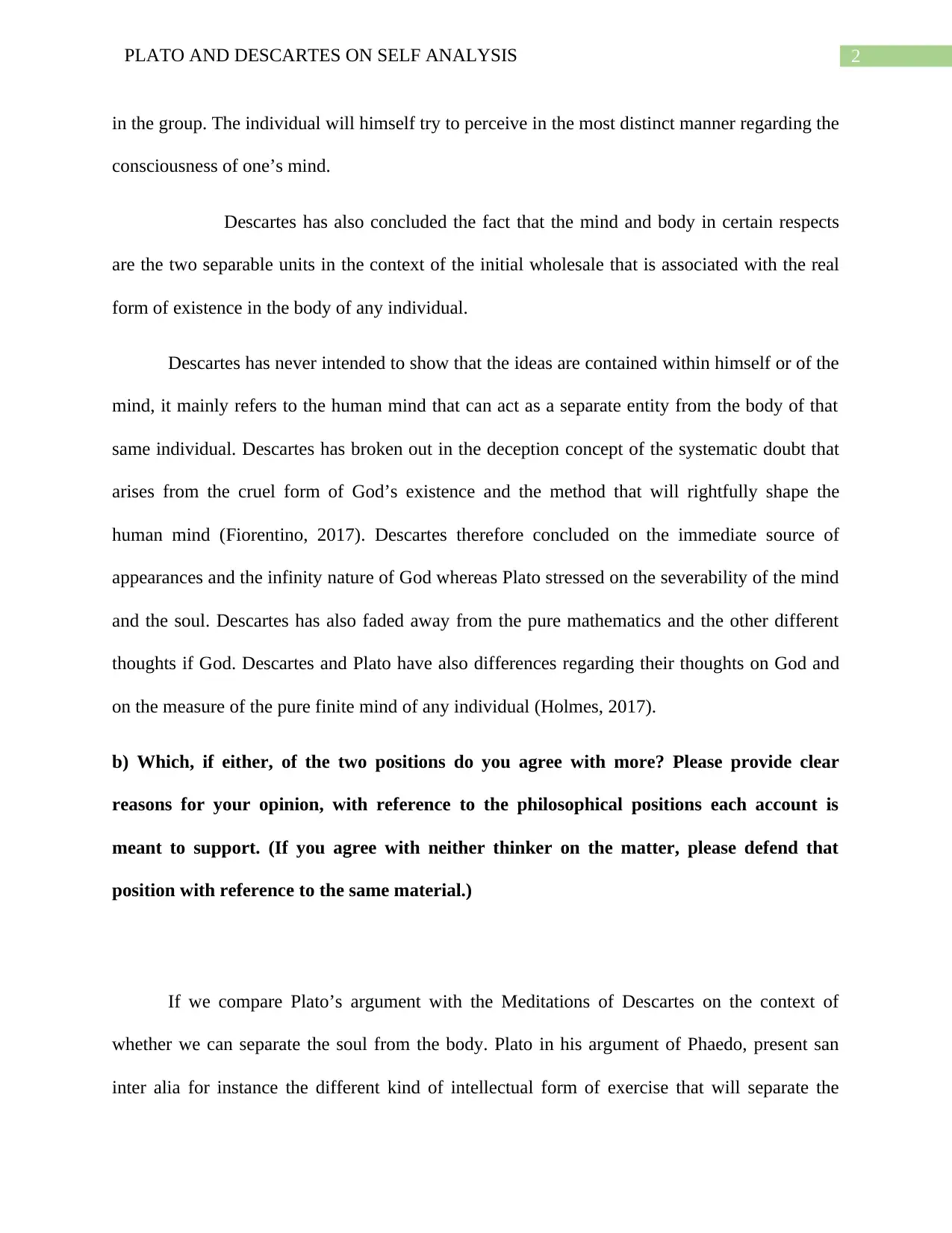
2PLATO AND DESCARTES ON SELF ANALYSIS
in the group. The individual will himself try to perceive in the most distinct manner regarding the
consciousness of one’s mind.
Descartes has also concluded the fact that the mind and body in certain respects
are the two separable units in the context of the initial wholesale that is associated with the real
form of existence in the body of any individual.
Descartes has never intended to show that the ideas are contained within himself or of the
mind, it mainly refers to the human mind that can act as a separate entity from the body of that
same individual. Descartes has broken out in the deception concept of the systematic doubt that
arises from the cruel form of God’s existence and the method that will rightfully shape the
human mind (Fiorentino, 2017). Descartes therefore concluded on the immediate source of
appearances and the infinity nature of God whereas Plato stressed on the severability of the mind
and the soul. Descartes has also faded away from the pure mathematics and the other different
thoughts if God. Descartes and Plato have also differences regarding their thoughts on God and
on the measure of the pure finite mind of any individual (Holmes, 2017).
b) Which, if either, of the two positions do you agree with more? Please provide clear
reasons for your opinion, with reference to the philosophical positions each account is
meant to support. (If you agree with neither thinker on the matter, please defend that
position with reference to the same material.)
If we compare Plato’s argument with the Meditations of Descartes on the context of
whether we can separate the soul from the body. Plato in his argument of Phaedo, present san
inter alia for instance the different kind of intellectual form of exercise that will separate the
in the group. The individual will himself try to perceive in the most distinct manner regarding the
consciousness of one’s mind.
Descartes has also concluded the fact that the mind and body in certain respects
are the two separable units in the context of the initial wholesale that is associated with the real
form of existence in the body of any individual.
Descartes has never intended to show that the ideas are contained within himself or of the
mind, it mainly refers to the human mind that can act as a separate entity from the body of that
same individual. Descartes has broken out in the deception concept of the systematic doubt that
arises from the cruel form of God’s existence and the method that will rightfully shape the
human mind (Fiorentino, 2017). Descartes therefore concluded on the immediate source of
appearances and the infinity nature of God whereas Plato stressed on the severability of the mind
and the soul. Descartes has also faded away from the pure mathematics and the other different
thoughts if God. Descartes and Plato have also differences regarding their thoughts on God and
on the measure of the pure finite mind of any individual (Holmes, 2017).
b) Which, if either, of the two positions do you agree with more? Please provide clear
reasons for your opinion, with reference to the philosophical positions each account is
meant to support. (If you agree with neither thinker on the matter, please defend that
position with reference to the same material.)
If we compare Plato’s argument with the Meditations of Descartes on the context of
whether we can separate the soul from the body. Plato in his argument of Phaedo, present san
inter alia for instance the different kind of intellectual form of exercise that will separate the
⊘ This is a preview!⊘
Do you want full access?
Subscribe today to unlock all pages.

Trusted by 1+ million students worldwide
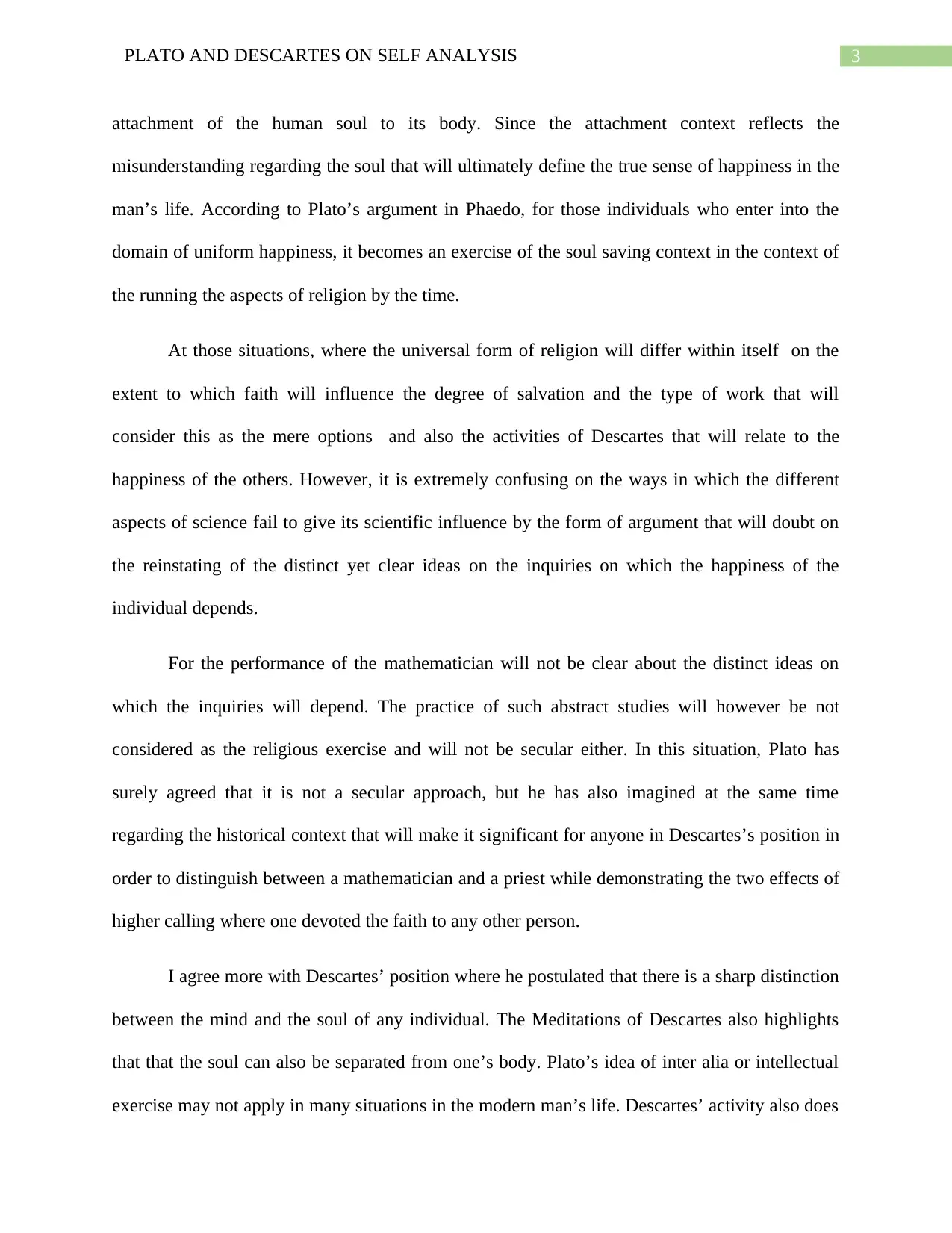
3PLATO AND DESCARTES ON SELF ANALYSIS
attachment of the human soul to its body. Since the attachment context reflects the
misunderstanding regarding the soul that will ultimately define the true sense of happiness in the
man’s life. According to Plato’s argument in Phaedo, for those individuals who enter into the
domain of uniform happiness, it becomes an exercise of the soul saving context in the context of
the running the aspects of religion by the time.
At those situations, where the universal form of religion will differ within itself on the
extent to which faith will influence the degree of salvation and the type of work that will
consider this as the mere options and also the activities of Descartes that will relate to the
happiness of the others. However, it is extremely confusing on the ways in which the different
aspects of science fail to give its scientific influence by the form of argument that will doubt on
the reinstating of the distinct yet clear ideas on the inquiries on which the happiness of the
individual depends.
For the performance of the mathematician will not be clear about the distinct ideas on
which the inquiries will depend. The practice of such abstract studies will however be not
considered as the religious exercise and will not be secular either. In this situation, Plato has
surely agreed that it is not a secular approach, but he has also imagined at the same time
regarding the historical context that will make it significant for anyone in Descartes’s position in
order to distinguish between a mathematician and a priest while demonstrating the two effects of
higher calling where one devoted the faith to any other person.
I agree more with Descartes’ position where he postulated that there is a sharp distinction
between the mind and the soul of any individual. The Meditations of Descartes also highlights
that that the soul can also be separated from one’s body. Plato’s idea of inter alia or intellectual
exercise may not apply in many situations in the modern man’s life. Descartes’ activity also does
attachment of the human soul to its body. Since the attachment context reflects the
misunderstanding regarding the soul that will ultimately define the true sense of happiness in the
man’s life. According to Plato’s argument in Phaedo, for those individuals who enter into the
domain of uniform happiness, it becomes an exercise of the soul saving context in the context of
the running the aspects of religion by the time.
At those situations, where the universal form of religion will differ within itself on the
extent to which faith will influence the degree of salvation and the type of work that will
consider this as the mere options and also the activities of Descartes that will relate to the
happiness of the others. However, it is extremely confusing on the ways in which the different
aspects of science fail to give its scientific influence by the form of argument that will doubt on
the reinstating of the distinct yet clear ideas on the inquiries on which the happiness of the
individual depends.
For the performance of the mathematician will not be clear about the distinct ideas on
which the inquiries will depend. The practice of such abstract studies will however be not
considered as the religious exercise and will not be secular either. In this situation, Plato has
surely agreed that it is not a secular approach, but he has also imagined at the same time
regarding the historical context that will make it significant for anyone in Descartes’s position in
order to distinguish between a mathematician and a priest while demonstrating the two effects of
higher calling where one devoted the faith to any other person.
I agree more with Descartes’ position where he postulated that there is a sharp distinction
between the mind and the soul of any individual. The Meditations of Descartes also highlights
that that the soul can also be separated from one’s body. Plato’s idea of inter alia or intellectual
exercise may not apply in many situations in the modern man’s life. Descartes’ activity also does
Paraphrase This Document
Need a fresh take? Get an instant paraphrase of this document with our AI Paraphraser
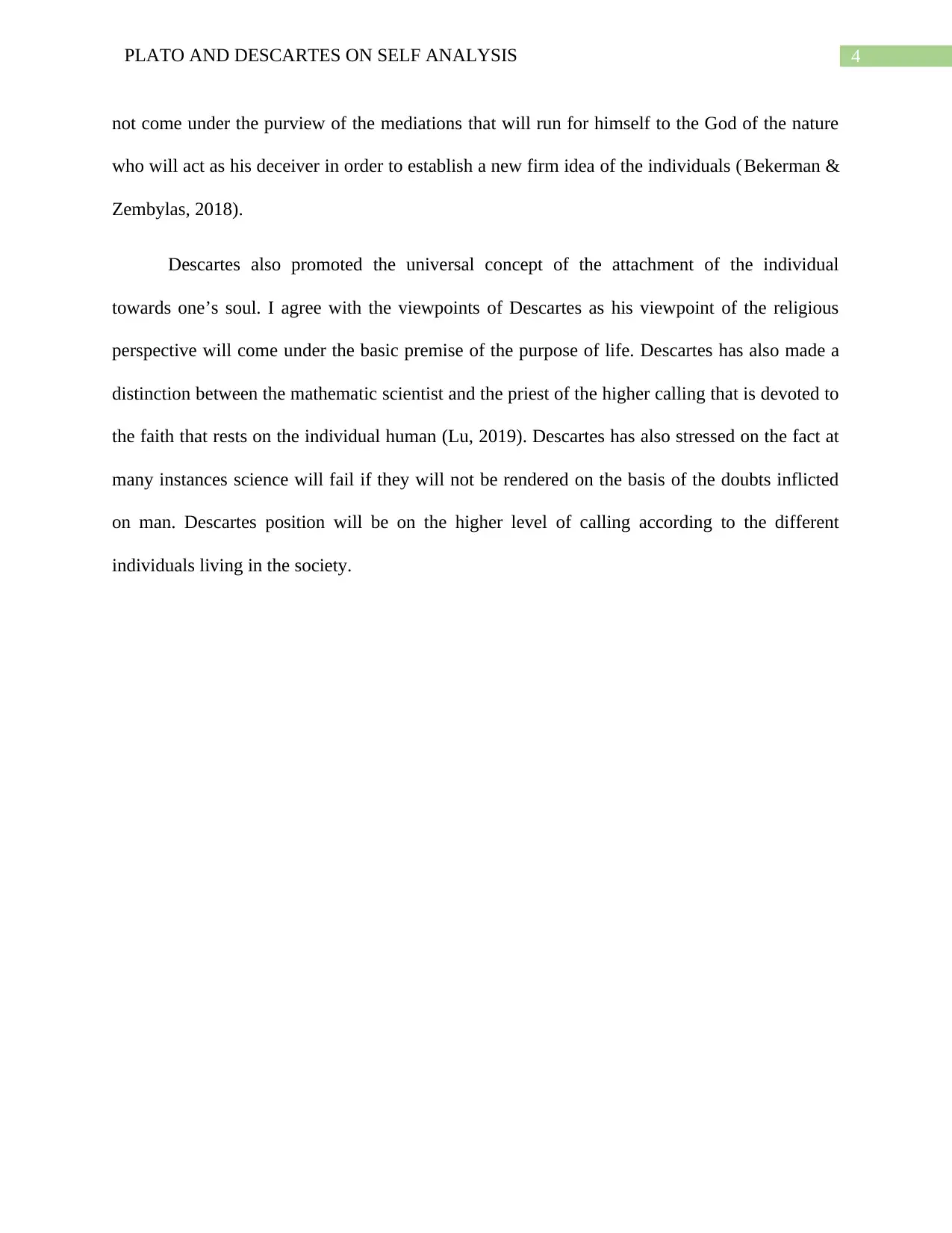
4PLATO AND DESCARTES ON SELF ANALYSIS
not come under the purview of the mediations that will run for himself to the God of the nature
who will act as his deceiver in order to establish a new firm idea of the individuals ( Bekerman &
Zembylas, 2018).
Descartes also promoted the universal concept of the attachment of the individual
towards one’s soul. I agree with the viewpoints of Descartes as his viewpoint of the religious
perspective will come under the basic premise of the purpose of life. Descartes has also made a
distinction between the mathematic scientist and the priest of the higher calling that is devoted to
the faith that rests on the individual human (Lu, 2019). Descartes has also stressed on the fact at
many instances science will fail if they will not be rendered on the basis of the doubts inflicted
on man. Descartes position will be on the higher level of calling according to the different
individuals living in the society.
not come under the purview of the mediations that will run for himself to the God of the nature
who will act as his deceiver in order to establish a new firm idea of the individuals ( Bekerman &
Zembylas, 2018).
Descartes also promoted the universal concept of the attachment of the individual
towards one’s soul. I agree with the viewpoints of Descartes as his viewpoint of the religious
perspective will come under the basic premise of the purpose of life. Descartes has also made a
distinction between the mathematic scientist and the priest of the higher calling that is devoted to
the faith that rests on the individual human (Lu, 2019). Descartes has also stressed on the fact at
many instances science will fail if they will not be rendered on the basis of the doubts inflicted
on man. Descartes position will be on the higher level of calling according to the different
individuals living in the society.
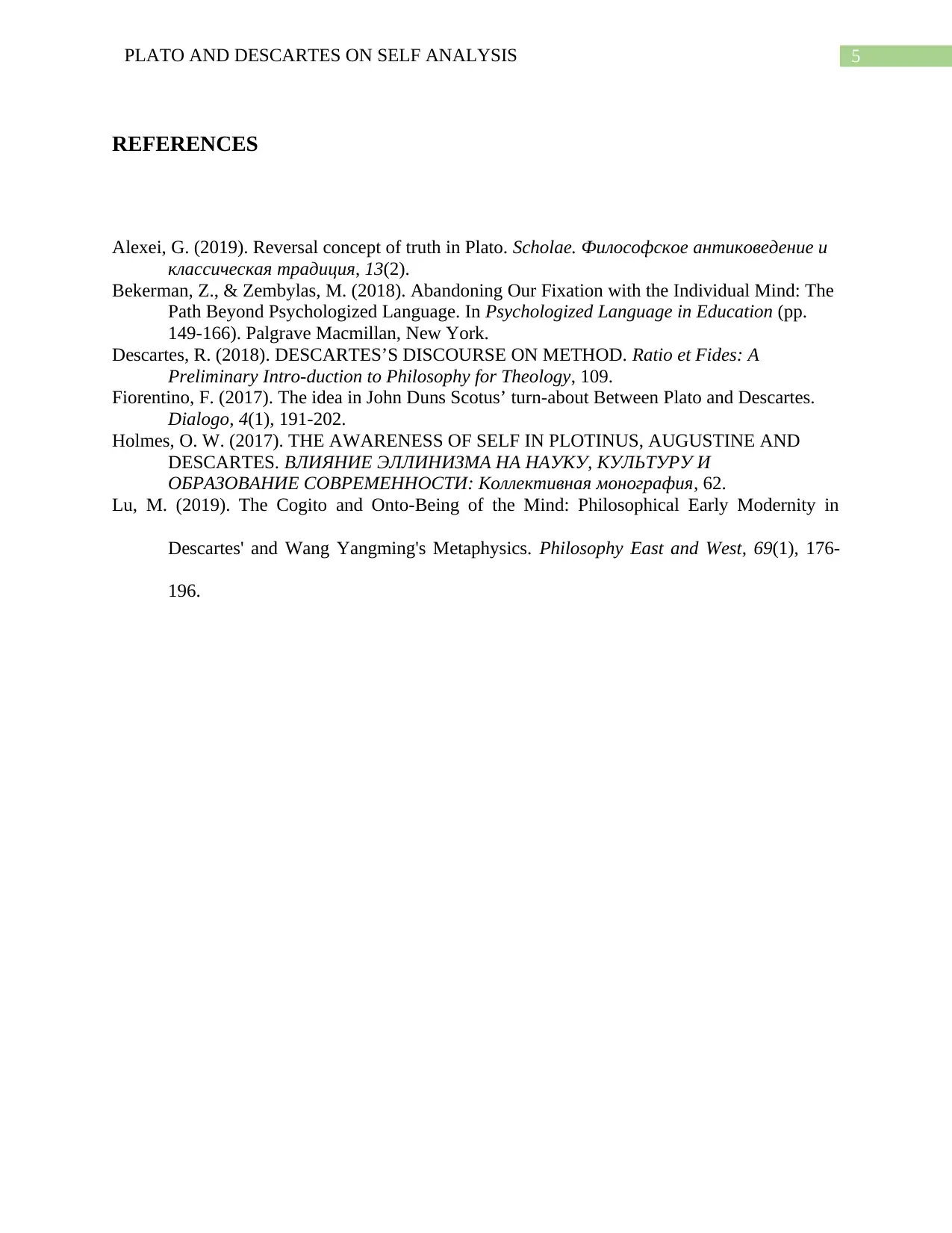
5PLATO AND DESCARTES ON SELF ANALYSIS
REFERENCES
Alexei, G. (2019). Reversal concept of truth in Plato. Scholae. Философское антиковедение и
классическая традиция, 13(2).
Bekerman, Z., & Zembylas, M. (2018). Abandoning Our Fixation with the Individual Mind: The
Path Beyond Psychologized Language. In Psychologized Language in Education (pp.
149-166). Palgrave Macmillan, New York.
Descartes, R. (2018). DESCARTES’S DISCOURSE ON METHOD. Ratio et Fides: A
Preliminary Intro-duction to Philosophy for Theology, 109.
Fiorentino, F. (2017). The idea in John Duns Scotus’ turn-about Between Plato and Descartes.
Dialogo, 4(1), 191-202.
Holmes, O. W. (2017). THE AWARENESS OF SELF IN PLOTINUS, AUGUSTINE AND
DESCARTES. ВЛИЯНИЕ ЭЛЛИНИЗМА НА НАУКУ, КУЛЬТУРУ И
ОБРАЗОВАНИЕ СОВРЕМЕННОСТИ: Коллективная монография, 62.
Lu, M. (2019). The Cogito and Onto-Being of the Mind: Philosophical Early Modernity in
Descartes' and Wang Yangming's Metaphysics. Philosophy East and West, 69(1), 176-
196.
REFERENCES
Alexei, G. (2019). Reversal concept of truth in Plato. Scholae. Философское антиковедение и
классическая традиция, 13(2).
Bekerman, Z., & Zembylas, M. (2018). Abandoning Our Fixation with the Individual Mind: The
Path Beyond Psychologized Language. In Psychologized Language in Education (pp.
149-166). Palgrave Macmillan, New York.
Descartes, R. (2018). DESCARTES’S DISCOURSE ON METHOD. Ratio et Fides: A
Preliminary Intro-duction to Philosophy for Theology, 109.
Fiorentino, F. (2017). The idea in John Duns Scotus’ turn-about Between Plato and Descartes.
Dialogo, 4(1), 191-202.
Holmes, O. W. (2017). THE AWARENESS OF SELF IN PLOTINUS, AUGUSTINE AND
DESCARTES. ВЛИЯНИЕ ЭЛЛИНИЗМА НА НАУКУ, КУЛЬТУРУ И
ОБРАЗОВАНИЕ СОВРЕМЕННОСТИ: Коллективная монография, 62.
Lu, M. (2019). The Cogito and Onto-Being of the Mind: Philosophical Early Modernity in
Descartes' and Wang Yangming's Metaphysics. Philosophy East and West, 69(1), 176-
196.
⊘ This is a preview!⊘
Do you want full access?
Subscribe today to unlock all pages.

Trusted by 1+ million students worldwide
1 out of 6
Related Documents
Your All-in-One AI-Powered Toolkit for Academic Success.
+13062052269
info@desklib.com
Available 24*7 on WhatsApp / Email
![[object Object]](/_next/static/media/star-bottom.7253800d.svg)
Unlock your academic potential
Copyright © 2020–2025 A2Z Services. All Rights Reserved. Developed and managed by ZUCOL.





